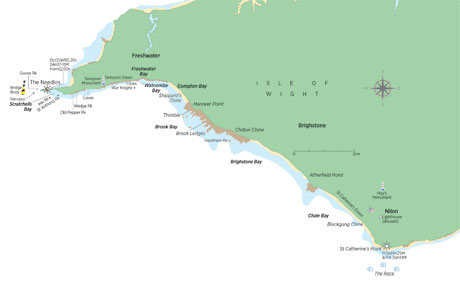Navigational tips and beauty spots around the south-west coast of the Isle of Wight.
Scratchell’s Bay to Freshwater

Photo: Graham Snook
You’ll notice that the cliffs are comprised of layers of chalk, all tilting down to the north, with flint marking the separation. You can go close in under the cliffs (‘How close?’ I asked. ‘Sandy, could you bring out a fender please?’ joked Peter) until about 300m west of Old Pepper Rock but head offshore and you can see the physical remains of Britain’s stillborn space programme.

Photo: Graham Snook
Known by many on the island as the amphitheatre, it’s more revealingly named by others as Black Knight, after the test vehicle for the Blue Streak missile that was designed and built by Saunders-Roe, later Westland Aircraft, in East Cowes, and static tested there between 1958-65. The test site is a concrete arc and the block in the middle was the control centre. The 11m Black Knight, and later the 13m Black Arrow rockets, were tested in gantries at either end with their blast deflected seawards. Actual re-entry launches took place at Woomera, Australia. The programme was cancelled when the Government decided it was more economical to buy American Scout rockets instead. Our space race was run.

Photo: Graham Snook
A large granite Iona cross, 147m up on West High Down, commemorates the poet Alfred Lord Tennyson, who lived in nearby Farringford House for 40 years, since 1853 (the Down is also known as Tennyson Down as he used to walk there in a fedora and black cape regardless of the weather). His friend Julia Margaret Cameron, a British pioneer of photography, bought Dimbola Lodge in nearby Freshwater.

Photo: Graham Snook
About halfway between Scratchell’s Bay and the Tennyson monument on West High Down, marked on charts as Cellar, are three caves, known as the Kitchen, Parlour and Cellar. These caves were so-called because Sir Robert Holmes used them as such to entertain guests.




